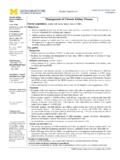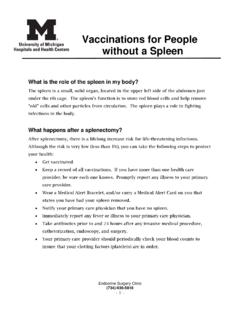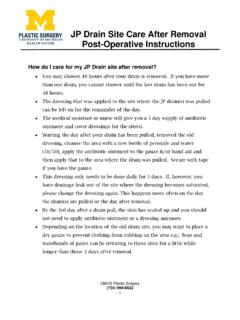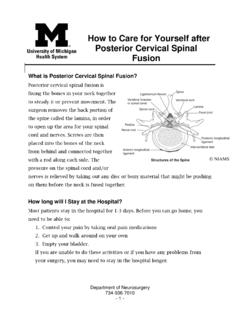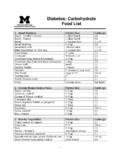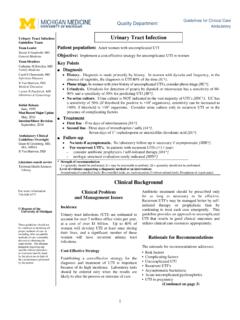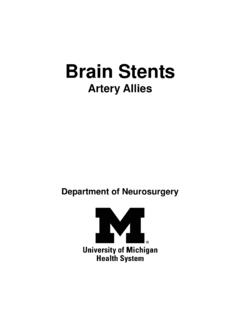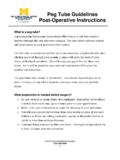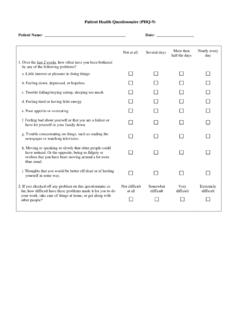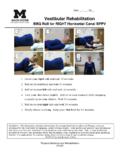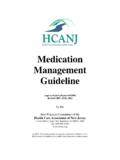Transcription of WEIGHT MANAGEMENT PROGRAM
1 WEIGHT MANAGEMENT PROGRAM Overview What is it? Behavioral lifestyle PROGRAM . 104 week PROGRAM consisting of Physician/ Provider and Dietitian visits. Very-low calorie diet followed by transition to balanced, individualized low calorie meal plans. Focus on long-term sustainable WEIGHT maintenance. Who may be eligible? Adults between 20 70* years old AND their Adolescent(s) between 15-17 years old (or younger at the discretion of the treating WMP physician). Body Mass Index (BMI) between 35 to 50 (kg/m2)**. **Asian/Asian-Indian with BMI between 27 to 50. -OR- BMI between 32 to 35 AND a WEIGHT -related health condition ( : type 2 diabetes). Which insurers cover the PROGRAM ? Blue Care Network (BCN). Blue Cross Blue Shield of Michigan (BCBSM). Health Alliance Plan (HAP).
2 Priority Health Commercial (other): patient would be provided with billing codes to check with the insurer *Medicare does NOT cover the PROGRAM WEIGHT MANAGEMENT PROGRAM Brief Overview Provider Visit: Start: Sched- Medical Dietitian Orientation & uling Research*. Paperwork history visit: Exam Start the Diet Discussion Labs *Optional Maintenance Phase Research*. Research* Very Low Calorie Diet Phase Weekly visits x 1. month PROGRAM Monthly visits, Completion thereafter 104 weeks, total WEIGHT MANAGEMENT PROGRAM . Want to know some STATISTICS about OBESITY? Check out Appendix (A). WEIGHT MANAGEMENT PROGRAM . We think it is important to know some of the FACTS about OBESITY. Energy Balance: What Determines WEIGHT ? BODY WEIGHT . INCREASE. Energy Intake Ingestion of.
3 Protein Fat DECREASE. Carbohydrate Energy Expenditure (EE). Physical Activity (exercise). Diet-Induced Thermogenesis (energy needed to break down and metabolize food). Basal Metabolic Rate (energy burned while at rest and the biggest contributor to EE). Body WEIGHT is determined by the balance between the calories we consume and the calories we expend (aka: burn ). OBESITY HEALTH. RISKS: What are the consequences of too much WEIGHT ? Overnutrition leads to a number of metabolic problems that lead to diseases such as diabetes and heart disease. WEIGHT MANAGEMENT PROGRAM . Want to have a better understanding of the DISEASE. of obesity? Check out Appendix (B). WEIGHT MANAGEMENT PROGRAM . PROGRAM GOAL: Identify strategies that will result in long-term WEIGHT MANAGEMENT for individuals with obesity, using the latest research and clinical strategies.
4 Educating, We are committed to motivating, and empowering individuals to make healthy lifestyle choices! WEIGHT MANAGEMENT PROGRAM . PERSONALIZED PROGRAM : Multidisciplinary approach to WEIGHT loss and WEIGHT maintenance Structured and organized into different phases: Initial: very low calorie diet Transition: low calorie diet Maintenance: individualized diet plan Services: one-on-one sessions that provide . Medical guidance Advice regarding activity/exercise/conditioning Strategies for prevention of WEIGHT regain: Behavioral Nutritional Pharmacological WEIGHT MANAGEMENT PROGRAM . Stepped Obesity Treatment Regimen What happens at the FIRST. VISIT to the physician/. provider? Your health and WEIGHT history is obtained. A physical exam is performed.
5 Your current medication list is reviewed. Blood work (aka: labs) are performed. The research is discussed and your consent to participate is obtained (if you are interested). WEIGHT MANAGEMENT PROGRAM . ADJUST medication regimen Minimize WEIGHT positive' medications Substitute with WEIGHT neutral or WEIGHT negative medications WEIGHT MANAGEMENT PROGRAM . PROVIDE Exercise prescription . Recommendations will be customized based on health status. Standard: work up to 40-60 minutes of exercise/ enhanced activity per day. Initial phase: low intensity activity Maintenance phase: moderate intensity activity WEIGHT MANAGEMENT PROGRAM . INITIATE caloric restriction Initial very-low-calorie diet (VLCD )(800. cals/day) or low-calorie-diet (LCD) (1000- 1200 cals/day): Meal substitution/replacement Dietary counseling: One-on-one with registered dietitian (RD).
6 Initial emphasis on calories and caloric density, not fuel The meal replacement diet will not start until you meet formally with the PROGRAM 's dietitian. WEIGHT MANAGEMENT PROGRAM . VERY-LOW Calorie Diet (VLCD) Phase Duration: 8-12 weeks*. Caloric intake: typically 800 calories/day*. Product(s): Optifast 800 Shakes (or Ready-to- Drink shakes). Optifast soups Optifast Bars (not used, initially). Details: will be explained by the dietitian. Average diet: typically 4-5 shakes + 1 soup *Variable: as determined by your provider The meal replacement diet will not start until you meet formally with the PROGRAM 's dietitian. WEIGHT MANAGEMENT PROGRAM . WHY use a VERY-LOW. Calorie Diet (VLCD)? Research on diets using VLCD shows that it is an effective tool both for WEIGHT loss and maintenance of a reduced WEIGHT .
7 It is intended to be a tool that is meant to be used on an intentional basis for a limited amount of time. Meal replacements are nutritionally replete, portion-controlled removing work of estimating portion sizes, convenient, make meals decision free and support stimulus control. While on the VLCD, there is time to learn nutrition information and start practicing lifestyle and behavioral skills WEIGHT MANAGEMENT PROGRAM . WHEN is a VERY-LOW. Calorie Diet (VLCD) used? Full meal replacement/ VLCD is appropriate for individuals who have a significant amount of WEIGHT to lose -AND- Past efforts to cut-back on food or follow a reduced calorie meal plan have not resulted in WEIGHT loss -OR- Past diet efforts have resulted in WEIGHT LOSS but the reduced WEIGHT could not be SUSTAINED.
8 WEIGHT MANAGEMENT PROGRAM . WHAT amount of WEIGHT loss should be expected on the VERY-LOW Calorie Diet (VLCD)? Every individual is DIFFERENT! In general, the following would be reasonable expectations: After 1-4 weeks: a WEIGHT loss of 3-6%. After 5-8 weeks: a WEIGHT loss of 7-11%. After 9-12 weeks: a WEIGHT loss of 12-20%. WEIGHT MANAGEMENT PROGRAM . CAN individuals with DIABETES use a VERY-LOW. Calorie Diet (VLCD)? YES! VLCD incorporating meal replacements are frequently recommended by physicians for their patients with diabetes because of the foods' nutritional formulation and low calories. Your medication (s) will be monitored by our physicians/. providers and dosage may change WEIGHT MANAGEMENT PROGRAM . CAN individuals with FOOD. ALLERGIES use OPTIFAST ?
9 Optifast products are generally well tolerated by most people. Optifast POWDERED shake mix (chocolate, vanilla, and strawberry) DO. contain small amounts of lactose. All other products are lactose-free. Some of our products, however, contain common allergens such as DAIRY, EGGS, WHEAT, SOY AND. PEANUTS. Please let us know if you have any allergies prior to beginning the shake regime, or if any GI discomfort occurs. WEIGHT MANAGEMENT PROGRAM . WHAT is the COST of OPTIFAST ? You are responsible for purchasing the product (~$ per shake or ~$12-14/day). Insurance does NOT cover the cost of meal replacements. Of note: The average American spends $151/week on food according to the US Bureau of Labor Statistics Consumer Expenditure Survey. WEIGHT MANAGEMENT PROGRAM .
10 HOW does the COST of OPTIFAST compare to fast food purchases? WEIGHT MANAGEMENT PROGRAM . HOW does the COST of OPTIFAST compare to other WEIGHT MANAGEMENT programs? The costs of our PROGRAM our comparable to/ competitive with many major commercial WEIGHT programs. WEIGHT MANAGEMENT PROGRAM . WHAT does our Clinic's research show about results of the VERY-LOW Calorie Diet (VLCD)? We know that WEIGHT loss at 2 weeks WEIGHT LOSS. 0. is associated with the amount of assessment 12 weeks 6 months 1 year 18 months 2 years -2. WEIGHT loss at 4 weeks. -4. Therefore, if the WEIGHT loss goal at 2 -6. Average WEIGHT Loss (%). weeks is not what is expected, we will re- -8. assess any barriers or issues related to -10. diet and help you navigate through any -12.
